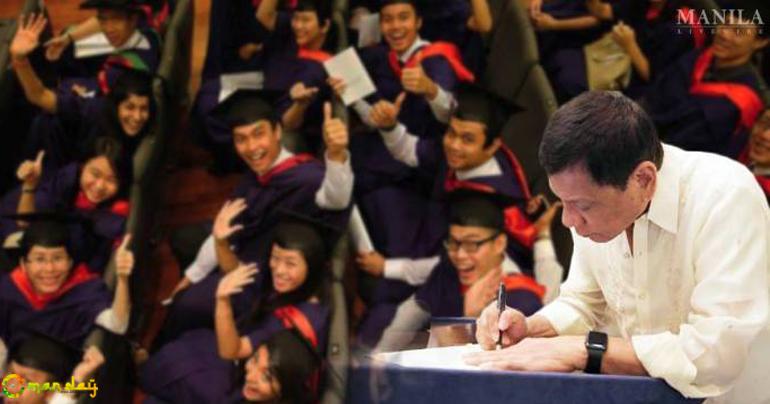What You Need To Know About Free College Education In The Philippines This 2018
Here is everything you need to know about the said law.
President Rodrigo Duterte has signed into a law a bill granting free tuition and other fees for students in state universities and colleges (SUCs), as well as local universities and colleges (LUCs) and technical-vocational institutions (TVIs). The Republic Act No. 10931 or the “Universal Access to Quality Tertiary Education Act,” covers a total of 112 state universities and colleges nationwide. The law guarantees free tuition and other miscellaneous fees for students in 112 state universities and colleges across the country.
“This ensures that Filipino students will enjoy free education in state universities and colleges, CHED-accredited local universities and colleges, and TESDA-accredited technical-vocational institutions,” Bam Aquino said. Aquino is one of the principal sponsors and a co-author of the law in the Senate.

“This would also give support to underprivileged students in private colleges and universities through a Tertiary Education Subsidy and a Student Loan Program,” he added.
Lawmakers assured that P40 billion has already been allotted for the program under the P3.767-trillion national budget for this year.
According to a report by ABS-CBN, everything written below is what you need to know about it.
The following are eligible for free tuition and other school fees:
1. Students in SUCs and LUCs, provided that they passed the entrance examination and other admission and retention requirements
– SUCs refer to public higher education institutions established by national laws which are financed and maintained by the national government and are governed by their respective independent boards of trustees or regents.
– LUCs refer to Commission on Higher Education-accredited public higher education institutions established by local government units through an enabling ordinance financially supported by the LGU concerned.
2. Students in state-run technical-vocational institutions (TVIs) under the Technical Education and Skills Development Authority (TESDA). TVIs provide non-degree programs aimed at preparing technicians, paraprofessionals and other categories of middle-level workers.
The law also provides a mechanism for students with financial capacity who want to opt out of the subsidy program for tuition and other fees. SUCs, LUCs, and state-run TVIs shall report the tuition payments and contributions collected to CHED and TESDA, respectively.
Meanwhile the following are ineligible to avail of the free tertiary education:
1. In SUCs and LUCs:
– Students who have already attained a bachelor’s degree or comparable undergraduate degree from ay higher education institution whether public or private.
– Students who fail to comply with the admission and retention policies of the SUC or LUC.
– Students who fail to complete their bachelor’s degree or comparable undergraduate degree within a year after the period prescribed in their program.
2. In state-run TVIs:
– Students who have obtained a bachelor’s degree as well as those who have received a certificate or diploma for a technical-vocational course equivalent to at least National Certificate III and above.
– Students who fail in any course enrolled in during the course of the program.
The law states that students ineligible of the free tertiary education shall be charged the tuition and other school fees, as determined by the respective boards of the SUCs and LUCs, and in the case of state-run TVIs, to be determined by the TESDA.
...[ Continue to next page ]
tag: blog , information
Share This Post






